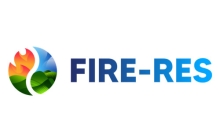Extreme wildfire events (EWE) are becoming a major environmental, economic and social threat in Southern Europe and increasingly gaining importance elsewhere in Europe. As the limits of fire suppression-centered strategies become evident, practitioners, researchers and policymakers increasingly recognise the need to develop novel approaches that shift emphasis to the root causes and impacts of EWE, moving towards preventive landscape and community management for greater resilience. FIRE-RES integrates existing research, technology, civil protection, policy and governance spheres related to wildfires to innovate processes, methods and tools to effectively promote the implementation of a more holistic fire management approach and support the transition towards more resilient landscapes and communities to EWE. To achieve this, FIRE-RES will, first, generate new knowledge on sustainable integrated fire management models that help to define what type of possible future scenarios (including climate change and general policies) should be promoted across EU territories. Second, it will identify and demonstrate innovations at the technological, social, health/safety, administrative, ecological and economic levels to define how and across which possible paths the future scenarios may be achieved in the EU. These innovations will be implemented in different regional contexts, and upscaled at the national and EU levels using an open innovation hub, promoting capacity building and partnership brokerage between public and private actors. Third, it will raise societal awareness and engagement on wildfire risk prevention, preparedness and response by leveraging existing national and cross-border networks at supranational levels. FIRE-RES is a transdisciplinary, multi-actor consortium, formed by researchers, wildfire agencies, technological companies, industry and civil society from 13 countries, linking to broader networks in science and disaster reduction management.
More information on the project website: https://fire-res.eu/ (last visited 27.7.2022)
This project has received funding from the European Horizon 2020 research and innovation programme under grant agreement No 101037419.

